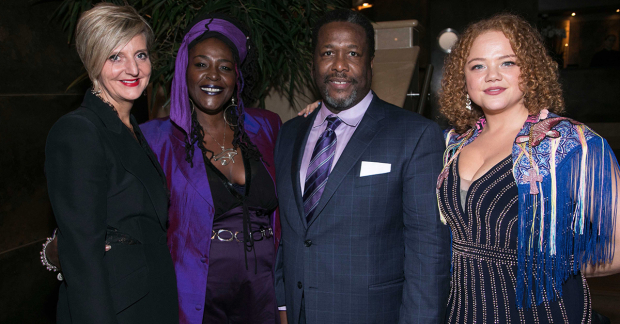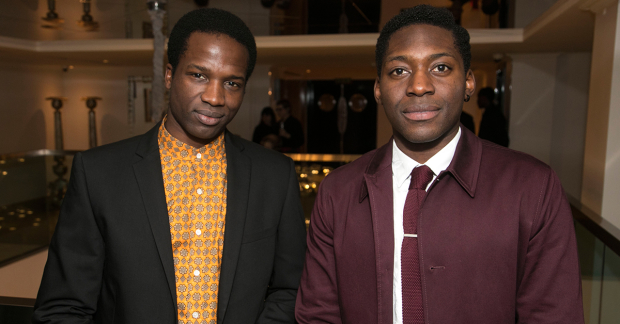Sharon D Clarke, Wendell Pierce and the Death of a Salesman team at West End opening night
Read the cast and creative team’s reactions of the West End transfer

© Dan Wooller for WhatsOnStage
"I waited 40 years for something like this. To make my debut in this play – with this production, these directors and this company – has just been amazing."
Wendell Pierce was clearly on a high after his opening night performance in Death of a Salesman on 4 November. The actor joins Olivier Award-winner Sharon D Clarke on stage, playing salesman Willy Loman in the Arthur Miller play reimagined by co-directors Marianne Elliott and Miranda Cromwell.
WhatsOnStage caught up with the four leads – Pierce, Clarke, Ṣọpẹ́ Dìrísù and Natey Jones – as well as composer and musical director Femi Temowo and co-directors Elliott and Cromwell after the opening night performance.
How are you feeling after the opening night performance?
Clarke: "I'm feeling fantastic, absolutely fantastic! We've had a great night, the audience has been really supportive and behind it."
Pierce: "I am soaring, I am so excited, I am so happy. I couldn't even dream of this, it's such a special night.
"You know what I wanna do tonight? I just wanna read the play. I wanna get in bed with the play and read it to Arthur Miller and say thank you."
Dìrísù: "I'm so proud of this production and I know that we did it justice, we worked really hard and all that hard work's paid off."
Temowo: "Excited, exhilarated and generally tired. It's been a mad four weeks getting back into rehearsal for this. What we've managed to achieve is a real deepening of the soundscape."
Elliott: "I feel a little bit in shock, I have to keep pinching myself. We felt very privileged to be working on it every day because it kept bringing forth more juice and more meat. It was just amazing."
Cromwell: "It's a life-changing experience for me really. Just life-changing. It's really shifted so much and I feel completely humbled, totally grateful.
"It feels so collaborative in such a beautiful way."
Has the Loman family dynamic changed with the show's transfer?
Pierce: "You see the love that the sons have for each other, the love that Linda and I have for each other."
Clarke: "Being Wendell's wife is a joy. He is very, very easy to love and is wonderful offstage and onstage."
Dìrísù: "It was really useful having both of us [Natey and myself] come into it at the same time. I've known Natey for a few years but never got to work with him so to do it with this play on this stage is such a blessing.
"I'll tell you what's difficult – hating Wendell. He's such a talent, such a wonderful man and he's really been a father figure to me in this piece. Biff's resentment towards him, I can't base it on anything that we share as people."
"There's a reason she [Sharon D Clarke] won so many awards at the British Black Theatre Awards recently and she deserved every single one of them.
"She's so talented, she's so generous and so disciplined that it's a pleasure working with her. As someone that i've looked up to for such a long time as this bastion of the industry, she is the mother. To get to work with her is a dream come true – I'm really glad I'm able to do it for the rest of the run."
Temowo: "Three hours every night, six hours twice a week – it's an amazing cast of people. They have an incredible way of finding those emotions every single time and I'm learning so much from them. There are a lot of talented people in this company and it's a beautiful thing to work with them."

© Dan Wooller for WhatsOnStage
How is the West End production different from its run at the Young Vic?
Pierce: "Of course it's gonna be different – different space, different people – but really good, classic writing means that it connects us all through time and place. No matter what actors or what space you do it in, if you connect to the authenticity of the play it sings."
Temowo: "It's a much bigger space, 3 or 4 times as many people. The Young Vic, you can do everything acoustically but here you have 1200+ people to contend with. The main difference has been contending with the largeness of the space and trying to fill the space without overdoing it."
Elliott and Cromwell have certainly brought a fresh perspective to this classic text.
Pierce: "Years from now it will still be speaking to people. It has touched the zeitgeist of our humanity and that's the thing that across time and place and whoever we are, it speaks.
"It's like the British Museum – you can never see it in a lifetime. Every time I come to London, I see another section, another painting. That's the same thing with the play – every time I do it, every time I come back to it I find something new."
Clarke: "With Marianne and Miranda being brave and thinking outside the box in the casting, I think the text is heightened and deepened and comes from a fresh perspective.
"There are lines in the show that now ping out and have a completely different meaning – when he's [Willy Loman] in the hotel room with The Woman and he says, 'I think there's a law about it in Masachussetts', that takes on a whole different connotation when you've got a black man and a white woman having a relationship in a time when there was segregation and there were lynchings. When you think about Willy driving those 700 miles through states where he could be lynched simply for the colour of his skin…
"We are a long way – 1949 – from President Obama. That glass ceiling is well and truly stuck there, so it makes us reexamine ourselves as a society and how far have we come."




















